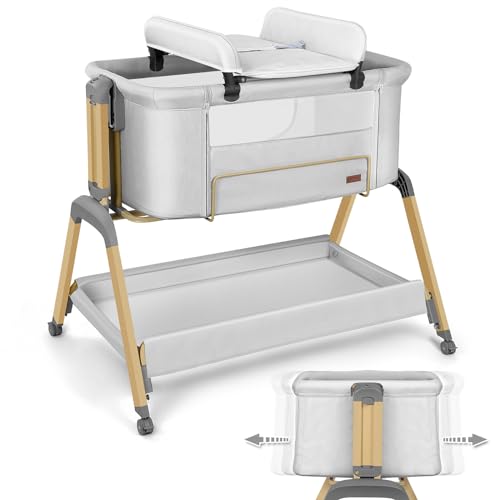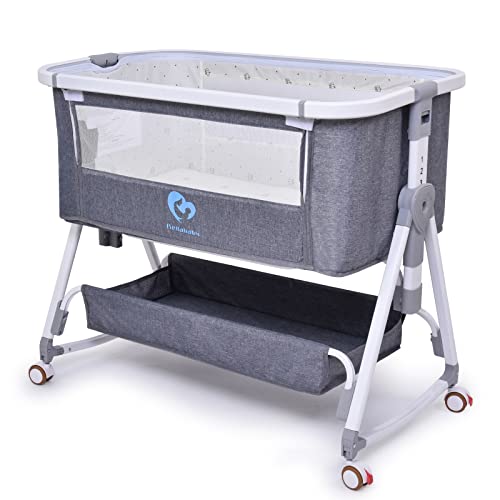A Peek Into Bedside Cosleeper's Secrets Of Bedside Cosleeper
페이지 정보
작성자 Collin 작성일 25-01-24 14:02 조회 30 댓글 0본문
Bedside Cosleeper
A bedside cosleeper is a bassinet that connects to the side of your adult bed. As long as you adhere to the CSPC guidelines cot for bedside sleeping areas for infants it's secure.
 These guidelines are very similar to crib bedding standards. Learn more about the guidelines here. When selecting a bedside sleep device, safety, comfort, and convenience are the main aspects to take into consideration.
These guidelines are very similar to crib bedding standards. Learn more about the guidelines here. When selecting a bedside sleep device, safety, comfort, and convenience are the main aspects to take into consideration.
Safety
Many new parents and expecting mothers have adopted cosleeping or bed-sharing, in line with the American Academy of Pediatrics recommendation that infants be in the same room as their parents. The Academy notes that room-sharing is safer than sleeping with babies in the same bed since it lowers the chance of Sudden Unexpected Death in Infancy or SIDS. The AAP doesn't recommend bed sharing but it does recommend that co-sleeping on a separate sleeping surface is a good option to lower the risk of SIDS. The development of the bedside crib was crucial for many families.
A bedside sleeper is attached to a bed frame that is suitable for adults. It is an equivalent of a crib-style sleeper. The bedside baby sleeper cosleeper lets parents to easily keep an eye on their baby, and it gives parents the freedom of a bed while keeping their baby close by. The top cosleepers adhere to strict safety standards and are built with durable, high-quality components. Be sure to look for the Juvenile Products Manufacturers Association (JPMA) stamp of approval, which confirms rigorous testing of the product and quality control to ensure your child's secure cosleeping experience.
The security of a cosleeper for the bed depends on several factors such as how it is installed and attached to the parent's bed. If the bedside cosleeper isn't attached to the parent's bed in a manner that eliminates the gaps and spaces in which an infant could be trapped, it could be a suffocation hazard. It is crucial that the attachment system of a bedside crib vs cot crib be tested to verify it can withstand the force that may be applied in the use of it, like the parent rolling on and off the sleeper, or 25-pound. The attachment system, or the corners of the bedside sleeper should be exposed to a horizontal force.
The voluntary standard for bedside sleepers incorporates by reference the federal consumer safety standard for products such as bassinets and cradles (16 CFR part 1218) that includes requirements for the performance of fabric-sided enclosed openings. The requirements that are mandatory in the standard also address neck and head dangers through insisting that following the application and release of a 50-lb. The standard also stipulates that following the release and application of 50-lb. must not be created. Only read-only copies of the standard can be found at ASTM's electronic Reading Room.
Convenience
While many parents have avoided cosleeping for fear of suffocation, SIDS or the "Ferberization" process that forces children to sleep on their own Anthropologists have noted that most primates and mammals, as well as people in non-Western societies, regularly cosleep. This may be because infants are soothed by the familiar voice of their mother, and it may also help them learn to self-soothe.
The best bedside sleepers have a clever design that attaches on the side of any mattress and swivels so you can easily reach it to change diapers or feeds during the middle of the night. Find one with feet that are adjustable and retract to accommodate various mattress heights and a large storage compartment to store all of your baby's needs.
Choose a bedside crib that will fit the standard crib bedding, so that it will be safe to use as your child grows. You may also want to think about a convertible model that can transform into a play yard or a more deep bassinet for years of use, and folds easily for travel cot bedside.
Portability
A bedside cosleeper that has wheels or a base that is lightweight is more portable than one with a heavy wooden frame or base. The Babybay Bedside Sleeper, HALO BassiNest Essentia and Snoo Smart Sleeper all come with great portability features: adjustable feet retract to accommodate platforms and the legs fold inward for maximum closeness to the mattress and a 100% mesh sidewalls that let airflow without material covering baby's mouth or nose.
 The Arm's Reach Clear-Vue is a excellent option that can be adjusted in 1" increments to fit in most adult beds. It can also function as an portable bassinet. It also swivels, allowing for quick access to baby so that you can soothe your baby, nurse or monitor her at night.
The Arm's Reach Clear-Vue is a excellent option that can be adjusted in 1" increments to fit in most adult beds. It can also function as an portable bassinet. It also swivels, allowing for quick access to baby so that you can soothe your baby, nurse or monitor her at night.
A bedside cosleeper is a bassinet that connects to the side of your adult bed. As long as you adhere to the CSPC guidelines cot for bedside sleeping areas for infants it's secure.
 These guidelines are very similar to crib bedding standards. Learn more about the guidelines here. When selecting a bedside sleep device, safety, comfort, and convenience are the main aspects to take into consideration.
These guidelines are very similar to crib bedding standards. Learn more about the guidelines here. When selecting a bedside sleep device, safety, comfort, and convenience are the main aspects to take into consideration.Safety
Many new parents and expecting mothers have adopted cosleeping or bed-sharing, in line with the American Academy of Pediatrics recommendation that infants be in the same room as their parents. The Academy notes that room-sharing is safer than sleeping with babies in the same bed since it lowers the chance of Sudden Unexpected Death in Infancy or SIDS. The AAP doesn't recommend bed sharing but it does recommend that co-sleeping on a separate sleeping surface is a good option to lower the risk of SIDS. The development of the bedside crib was crucial for many families.
A bedside sleeper is attached to a bed frame that is suitable for adults. It is an equivalent of a crib-style sleeper. The bedside baby sleeper cosleeper lets parents to easily keep an eye on their baby, and it gives parents the freedom of a bed while keeping their baby close by. The top cosleepers adhere to strict safety standards and are built with durable, high-quality components. Be sure to look for the Juvenile Products Manufacturers Association (JPMA) stamp of approval, which confirms rigorous testing of the product and quality control to ensure your child's secure cosleeping experience.
The security of a cosleeper for the bed depends on several factors such as how it is installed and attached to the parent's bed. If the bedside cosleeper isn't attached to the parent's bed in a manner that eliminates the gaps and spaces in which an infant could be trapped, it could be a suffocation hazard. It is crucial that the attachment system of a bedside crib vs cot crib be tested to verify it can withstand the force that may be applied in the use of it, like the parent rolling on and off the sleeper, or 25-pound. The attachment system, or the corners of the bedside sleeper should be exposed to a horizontal force.
The voluntary standard for bedside sleepers incorporates by reference the federal consumer safety standard for products such as bassinets and cradles (16 CFR part 1218) that includes requirements for the performance of fabric-sided enclosed openings. The requirements that are mandatory in the standard also address neck and head dangers through insisting that following the application and release of a 50-lb. The standard also stipulates that following the release and application of 50-lb. must not be created. Only read-only copies of the standard can be found at ASTM's electronic Reading Room.
Convenience
While many parents have avoided cosleeping for fear of suffocation, SIDS or the "Ferberization" process that forces children to sleep on their own Anthropologists have noted that most primates and mammals, as well as people in non-Western societies, regularly cosleep. This may be because infants are soothed by the familiar voice of their mother, and it may also help them learn to self-soothe.
The best bedside sleepers have a clever design that attaches on the side of any mattress and swivels so you can easily reach it to change diapers or feeds during the middle of the night. Find one with feet that are adjustable and retract to accommodate various mattress heights and a large storage compartment to store all of your baby's needs.
Choose a bedside crib that will fit the standard crib bedding, so that it will be safe to use as your child grows. You may also want to think about a convertible model that can transform into a play yard or a more deep bassinet for years of use, and folds easily for travel cot bedside.
Portability
A bedside cosleeper that has wheels or a base that is lightweight is more portable than one with a heavy wooden frame or base. The Babybay Bedside Sleeper, HALO BassiNest Essentia and Snoo Smart Sleeper all come with great portability features: adjustable feet retract to accommodate platforms and the legs fold inward for maximum closeness to the mattress and a 100% mesh sidewalls that let airflow without material covering baby's mouth or nose.
 The Arm's Reach Clear-Vue is a excellent option that can be adjusted in 1" increments to fit in most adult beds. It can also function as an portable bassinet. It also swivels, allowing for quick access to baby so that you can soothe your baby, nurse or monitor her at night.
The Arm's Reach Clear-Vue is a excellent option that can be adjusted in 1" increments to fit in most adult beds. It can also function as an portable bassinet. It also swivels, allowing for quick access to baby so that you can soothe your baby, nurse or monitor her at night.댓글목록 0
등록된 댓글이 없습니다.
